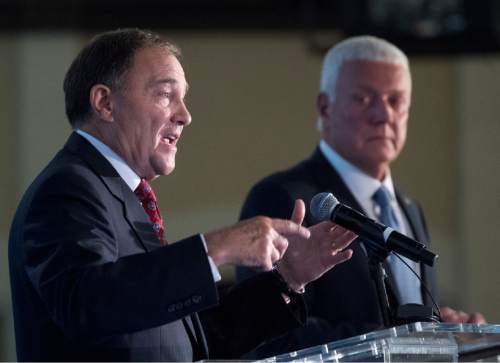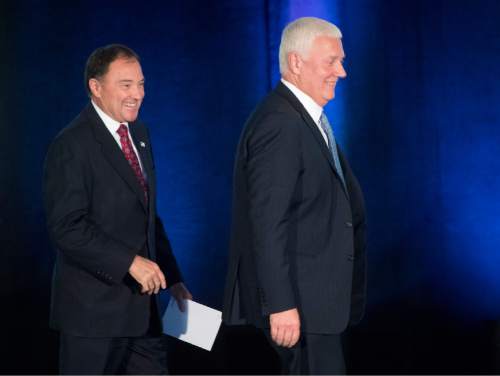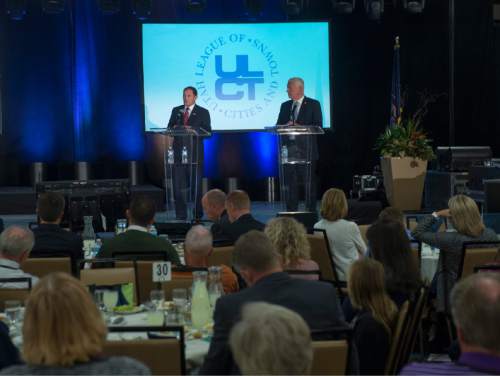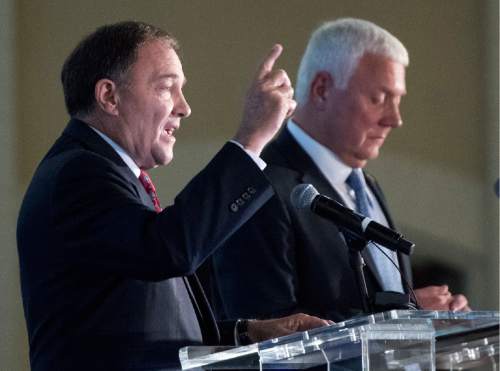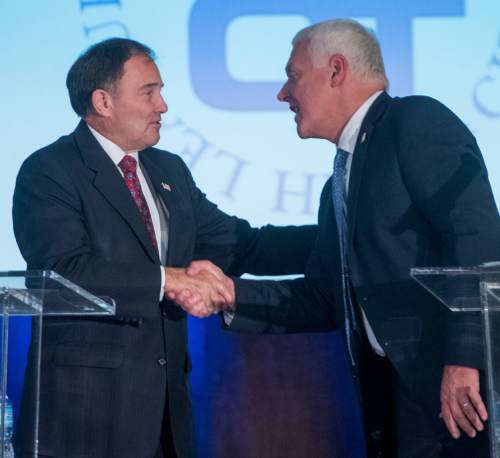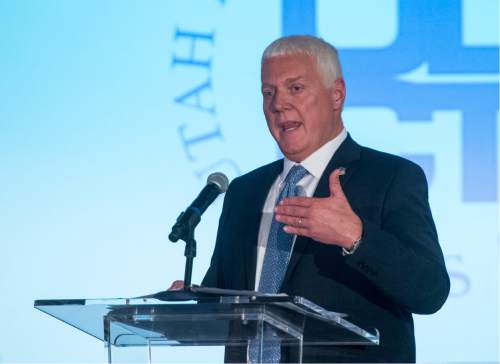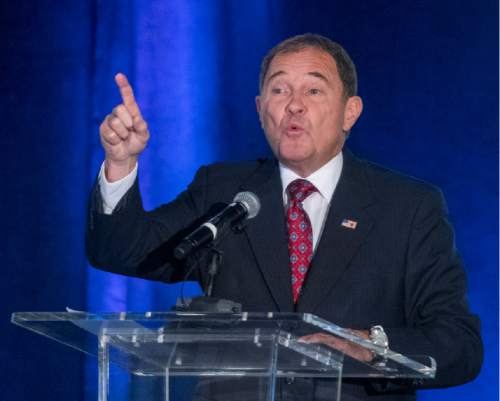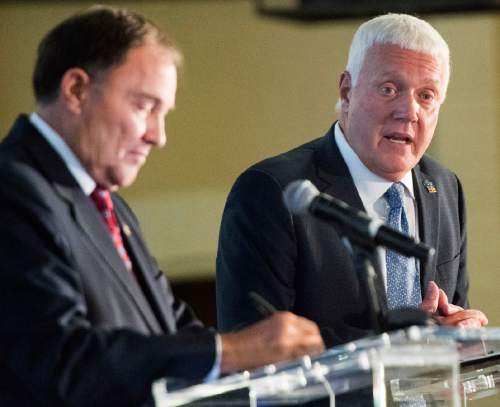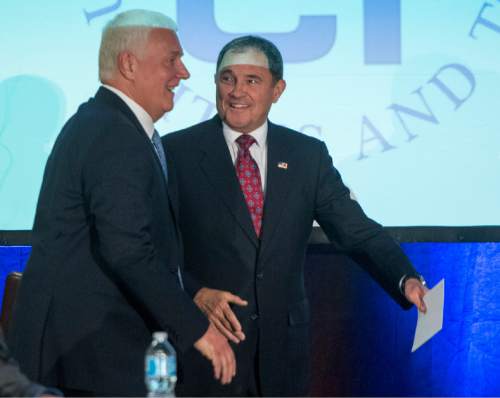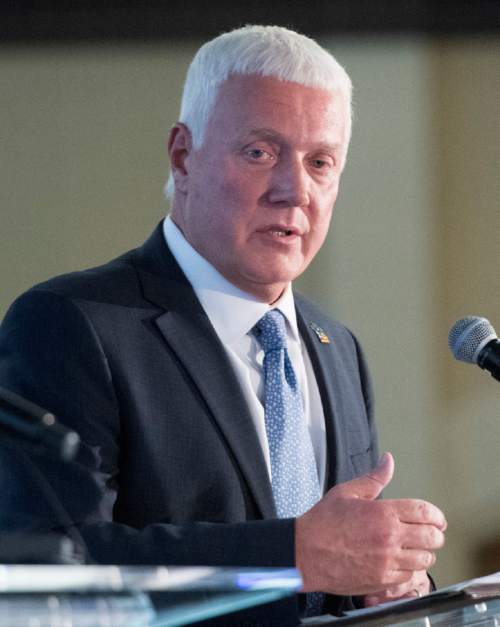This is an archived article that was published on sltrib.com in 2016, and information in the article may be outdated. It is provided only for personal research purposes and may not be reprinted.
Gov. Gary Herbert and challenger Mike Weinholtz squared off in their first public debate Friday, with the starkest contrast coming in their views on management of public lands and their attitude toward the federal government.
Weinholtz repeatedly castigated Herbert and Republican legislators for throwing as much as $14 million toward what he said is a futile lawsuit seeking to seize ownership of more than 30 million acres of federal land within the state.
"That's not only morally bankrupt," Weinholtz said, "it's fiscally irresponsible."
The Democrat also said after the debate that he would support President Barack Obama using the Antiquities Act to designate the 1.9 million-acre Bears Ears National Monument in southeastern Utah. Weinholtz said his support is based on what he has heard from American Indian tribal leaders in the area, who say that Herbert has cherry-picked tribal members opposed to the monument and portrayed them as speaking for the majority.
The Republican governor has adamantly opposed the creation of the monument, instead supporting Rep. Rob Bishop's Public Lands Initiative pending in Congress. That bill would make a smaller area — 1.4 million acres — a national conservation area with less protection and allowing energy development.
With time running out in this Congress and Obama expected to decide on a designation before he leaves office, Herbert is expected to go to Washington, D.C., this month to present a potential compromise plan for the area, although he has not discussed specifics.
Weinholtz said communities adjacent to public land do better when it is managed by the federal government and urged Republican leaders to "stop villainizing the federal government at every turn."
If he is governor, Weinholtz said he would try to work with the Legislature to persuade it to abandon the lawsuit and, if that doesn't work, would lead a ballot measure to let voters, who he argued oppose the litigation, block the crusade.
A UtahPolicy.com poll earlier this year found that 46 percent of Utahns oppose the lawsuit, while 44 percent support it.
"Our public lands are our home and our heritage and what we leave behind for our children and future generations," Weinholtz said. "If we sell off our public lands, the way Governor Herbert has planned to do, we're going to lose our heritage."
A feisty Herbert insisted Weinholtz was misrepresenting his record.
"First off, I've never suggested selling the public lands," Herbert said. "The question is, who's going to manage them, and the management we've had with the federal government has come up short."
He said the state has lost its lumber industry because it can't spray for bark beetles that have destroyed forests and left them fire hazards. Invasive grass has encroached on the land, adding to the fire danger.
Herbert said Weinholtz should get out and visit people in rural counties and listen to what they have to say about conditions "in their backyards."
Herbert has not said that state control of the lands means they will be sold and he insists studies have shown it is economically feasible. A 2014 state study found that the costs and revenue generated could balance out, but only if oil was selling for $62 a barrel and drilling continues to grow in the state. Currently, oil is selling for about $43, and new drilling has ground to a halt.
The governor said that, under federal management, oil and gas leases take far too long to get approved compared to the permitting done on state-managed land in other states and that puts Utah at a "competitive disadvantage."
The debate, hosted by the Utah League of Cities and Towns, focused heavily on municipal issues. Weinholtz failed to land many blows on the governor, who defended his record in office before a largely pro-Herbert audience.
The candidates agreed on the need for air quality and investment in roads and public transit.
Both support efforts by the state to collect sales taxes on online purchases, which are costing the state an estimated $200 million annually in uncollected tax revenue. Weinholtz said he supports a bill that was sponsored by Rep. Mike McKell, R-Spanish Fork, last session that would require retailers in the state to pay the taxes. Herbert supported the measure but said the ultimate solution is either congressional action or states acting on their own and forcing the U.S. Supreme Court to decide if they have the power to collect the taxes on purchases in other states.
Weinholtz criticized the Legislature for meddling with cities on issues such as billboard zoning and other ordinances.
"Utah can't complain about federal [government] overreach when we do the same to you. It's hypocrisy," Weinholtz said.
"Utah can and will complain every chance we get about federal overreach," Herbert shot back, receiving applause.
Herbert had initially declined the league's invitation to debate Weinholtz, but changed his mind late Thursday, sending the group scrambling to line up moderators for the event.
A second debate, sponsored by the nonpartisan Utah Debate Commission, is scheduled for Sept. 26. It is the only other debate that Herbert has agreed to attend.
Twitter: @RobertGehrke


